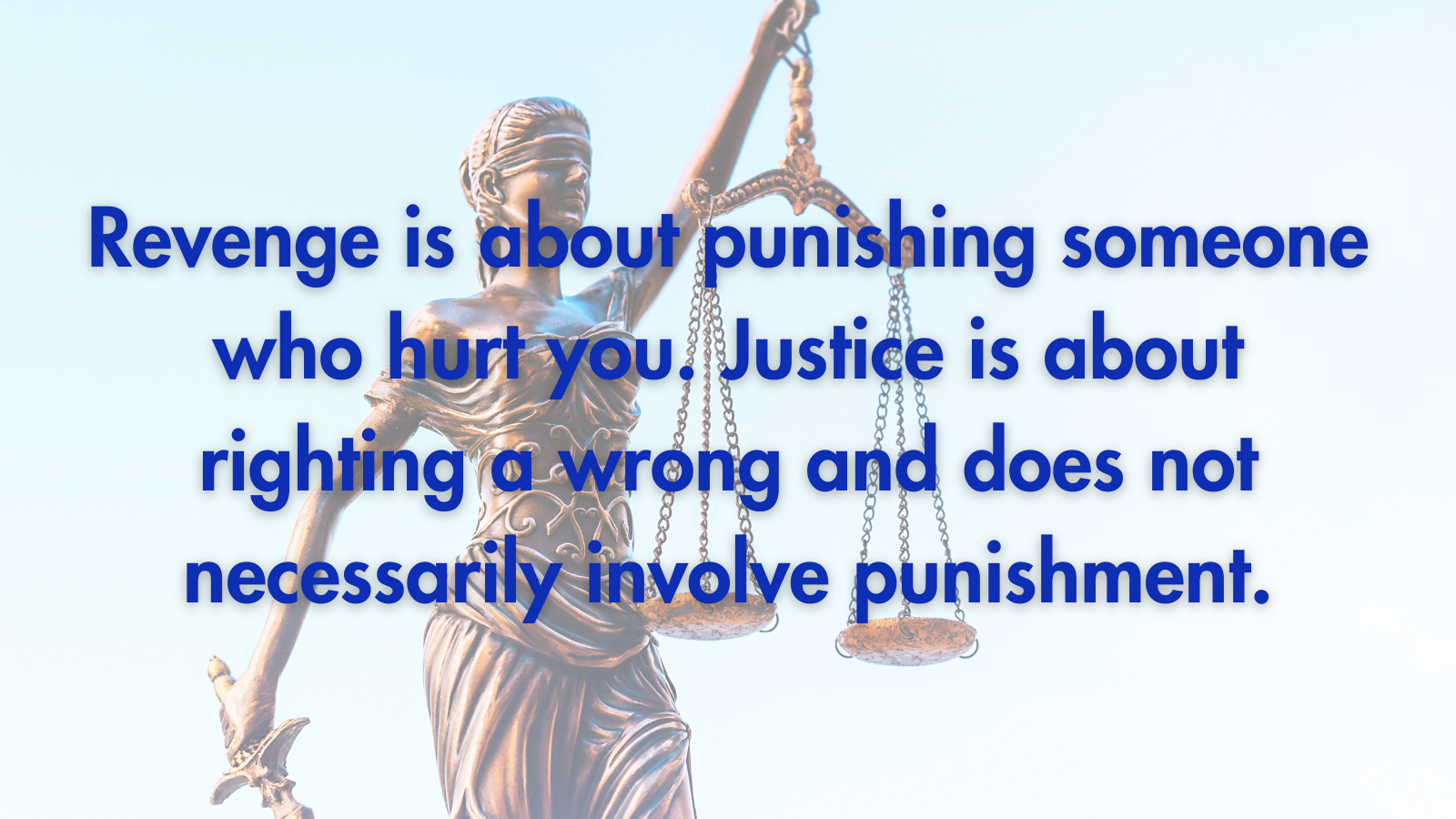Unraveling the Narrative of Victim Blaming and Silencing in Cases of Domestic Abuse
Introduction
In the realm of interpersonal conflicts and injustices, two powerful forces often come into play: revenge and justice. While revenge seeks to retaliate and punish, justice strives for fairness and accountability. However, the lines between these concepts can blur, particularly in cases of domestic abuse and betrayal within relationships. In this article, I’m looking into the complexities surrounding revenge and justice, particularly concerning how women are often victim blamed and silenced in cases of domestic abuse or sexual assault. We’ll explore how victims are labelled as “spiteful” or “revengeful,” especially when they seek to hold their abusers accountable. Additionally, we’ll analyze the dynamics of infidelity within relationships, where the betrayed spouse is often portrayed as seeking revenge rather than justice.
Victim Blaming and Silencing: A Barrier to Justice
One of the most significant barriers to seeking justice in cases of domestic abuse or sexual assault is victim blaming and silencing. Women, in particular, face immense societal pressure to remain silent about their experiences, often fearing disbelief, judgment, or retaliation. This culture of victim blaming shifts the focus away from the perpetrator’s actions and places the burden of responsibility on the victim.
For instance, consider a scenario where a woman reports her abusive partner to authorities. Instead of being met with empathy and support, she may encounter scepticism and blame. Questions like, “What did you do to provoke him?” or “Why didn’t you leave earlier?” imply that the victim somehow brought the abuse upon themselves. This victim blaming not only undermines the survivor’s credibility but also perpetuates the cycle of abuse by allowing the perpetrator to evade accountability.
Moreover, societal stereotypes and gender norms often dictate how victims are perceived and treated. Women who speak out against their abusers may be labelled as “troublemakers” or “drama queens.” This discourages them from seeking help. This silencing effect is compounded by the fear of retribution, especially if the abuser holds power or influence within the community.
Infidelity and the “Woman Scorned” Narrative
Infidelity within relationships is another context where the dynamics of revenge and justice come into play. When a spouse cheats, the betrayed partner may experience a range of negative emotions, including anger, betrayal, and a desire for retribution. Society often portrays the betrayed spouse, especially if she is a woman, as “spiteful” or “revengeful” for seeking accountability from the cheater.
This narrative of the “woman scorned” not only diminishes the validity of the betrayed partner’s feelings but also absolves the cheater of responsibility for their actions. Instead of acknowledging the harm caused by infidelity, the focus shifts to the betrayed partner’s reaction, painting her as irrational or vindictive. This narrative serves to delegitimize the betrayed partner’s pursuit of justice and reinforces gender stereotypes about women’s emotional volatility.
Furthermore, the cheater may attempt to gaslight or manipulate the situation by portraying themselves as victims. They may claim that their infidelity was a result of dissatisfaction or unhappiness in the relationship, deflecting blame onto their partner. By framing themselves as the aggrieved party, the cheater seeks to evade accountability and justify their actions.
Revenge vs. Justice: Seeking Accountability and Fairness
In the face of victim blaming and silencing, it’s crucial to distinguish between revenge and justice. While revenge seeks to inflict harm and retaliate against perceived wrongdoing, justice aims for accountability and fairness. Seeking justice in cases of domestic abuse or betrayal is not about revenge; it’s about holding perpetrators accountable for their actions. Victims should receive the support and validation they deserve.
For instance, advocating for stronger legal protections for survivors of domestic abuse and sexual assault is a pursuit of justice, not revenge. Providing resources and support services for survivors empowers them to seek help and break free from the cycle of abuse. Additionally, holding perpetrators accountable through legal channels sends a clear message that abuse will not be tolerated in any form.
Similarly, in cases of infidelity, seeking a fair and equitable resolution is not about seeking revenge on the cheater. It’s about acknowledging the harm caused by betrayal and working towards rebuilding trust and healing within the relationship. This may involve open communication, therapy, and a commitment to addressing underlying issues that contributed to the infidelity.
Injustices When Seeking Justice
In the realm of seeking justice for survivors of emotional and psychological abuse, women often face significant injustices within the legal system. Despite the recognition of coercive control and narcissistic abuse as forms of intimate partner violence, many solicitors, police officers, and courts dismiss or trivialize these experiences due to a lack of understanding. The subtle and insidious nature of emotional abuse makes it difficult for survivors to articulate their experiences. When professionals are not trauma-informed or lack knowledge and where laws are unclear providing advice is difficult.
Solicitors may overlook or minimize the impact of emotional abuse, focusing instead on tangible evidence or physical harm. Police officers, trained to respond to more overt forms of violence, may fail to recognize the signs of coercive control. Or dismiss them as “just a relationship issue.” In courtrooms, survivors may struggle to convey the complexities of their experiences. This is further exacerbated by a lack of empathy and understanding from judges and legal professionals. As a result, women are often denied the justice and protection they deserve, perpetuating the cycle of abuse and trauma.
Failed by the justice system
The societal impact on women who are failed by the justice system, particularly in cases where non-married women lack protection under family law, is profound and far-reaching. In many countries, the legal system predominantly focuses on providing recourse for married couples. This leaves non-married partners vulnerable when relationships end. The absence of legal recognition and protection for non-married women means they often face significant barriers in asserting their rights. Women are unable to secure fair treatment.
Gaps in the law leave non-married women exposed to a myriad of challenges when a relationship dissolves. Without the safeguards afforded by family law, women are at risk of being left in precarious housing situations and financially insecure. In many cases, the unequal power dynamics within relationships exacerbate these vulnerabilities, with women often lacking financial autonomy or control over assets. When their names are not on the deeds of the home or other properties, non-married women may find themselves without any legal entitlement to a financial settlement or division of assets, leaving them without a safety net to rebuild their lives. This lack of legal protection not only perpetuates gender inequality but also reinforces systemic barriers that hinder women’s economic empowerment and independence.
Consequences of living together
When I self-published my story to raise awareness of hidden forms of abuse the UK was again debating the laws surrounding the consequences of living together. Later that year in November 2022 the House of Commons, Women and Equalities Committee published the Government Response to their second report “The rights of cohabiting partners.” It was disappointing to see yet again that the recommendation to introduce a cohabitation law for England and Wales was rejected. The report made a recommendation for an opt-out cohabitation regime similar to the one proposed by the Law Commission in 2007.
When Legal Advice Goes Awry – YouTube Video.
Find it on Amazon and Digital ebook Stores
“Post Separation Abuse, Betrayal & Abandonment, What Type Of Man?”
★☆★ Amazon ★☆★
★☆★Ebook On Digital Platforms ★☆★
Conclusion
Revenge and justice are powerful forces that shape our responses to interpersonal conflicts and injustices. In cases of domestic abuse and betrayal, women are often victim blamed and silenced, making it difficult for them to seek justice for the harm they’ve endured. The narrative of the “woman scorned” further perpetuates stereotypes and undermines the validity of their experiences.
Injustice when seeking Justice. Women need support to report; in my experience, the legal advice received did not help me. The advice was conflicting, and trying to make difficult decisions while in a place of grief, fear and emotional turmoil is not the best thing to do. Professionals need to educate themselves and understand how trauma impacts survivors.
Gaps in the law.
Gaps in the law. There needs to be a clear process at the end of a cohabiting relationship. The legal professionals need to consider acts of “coercive control” emotional and psychological abuse which can morph into post-separation abuse when a relationship ends.
When we can distinguish between revenge and justice, we can challenge these harmful narratives and advocate for accountability and fairness. Supporting survivors, holding perpetrators accountable, and promoting gender equality are essential steps towards creating a society where justice prevails over revenge. It’s time to shift the focus from blaming victims to holding perpetrators accountable. Society needs to create a culture of empathy, respect, morality and equality.


